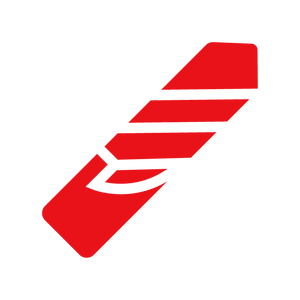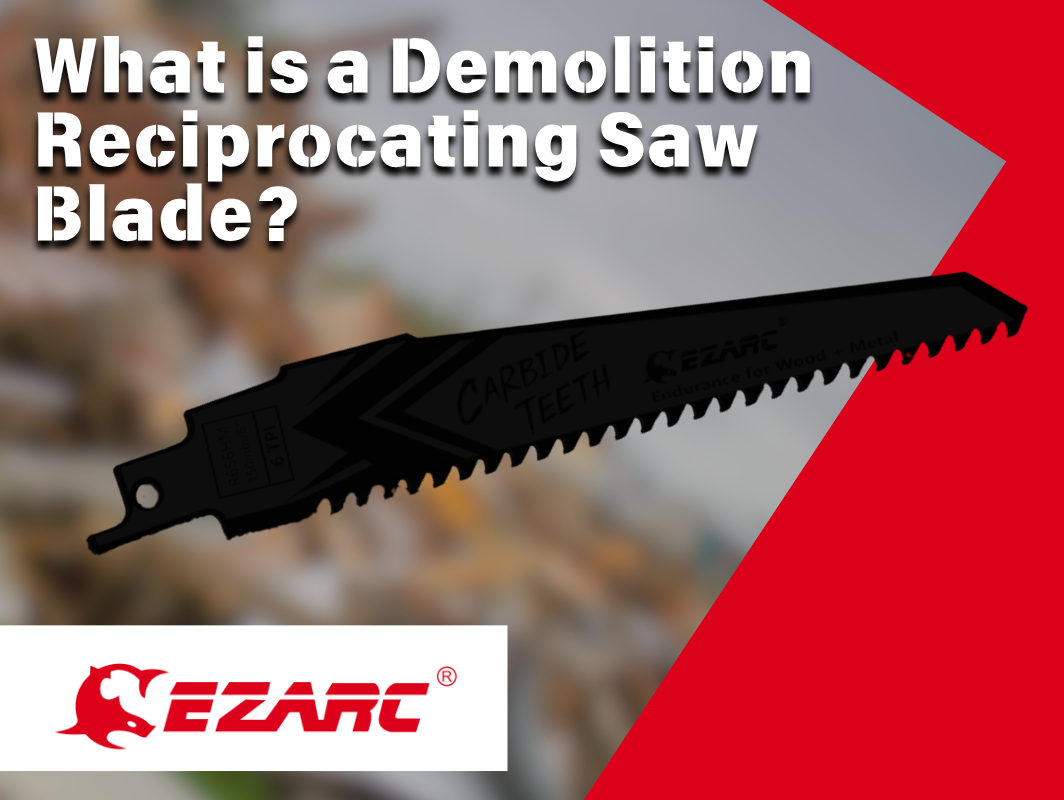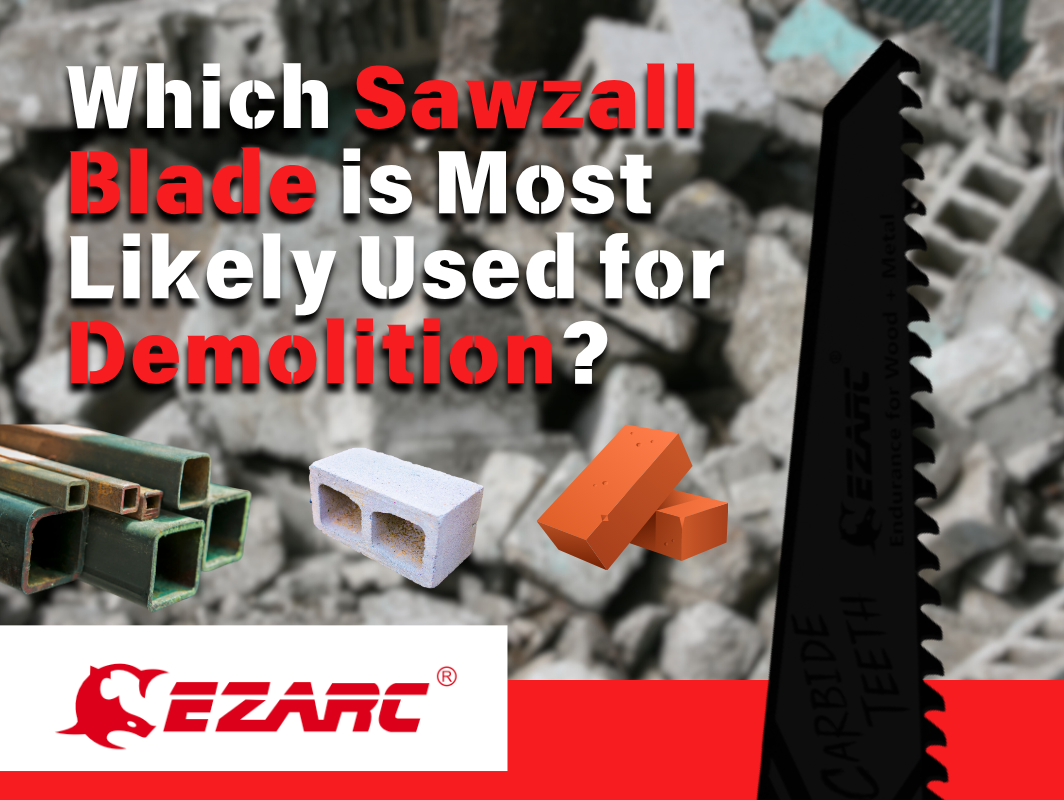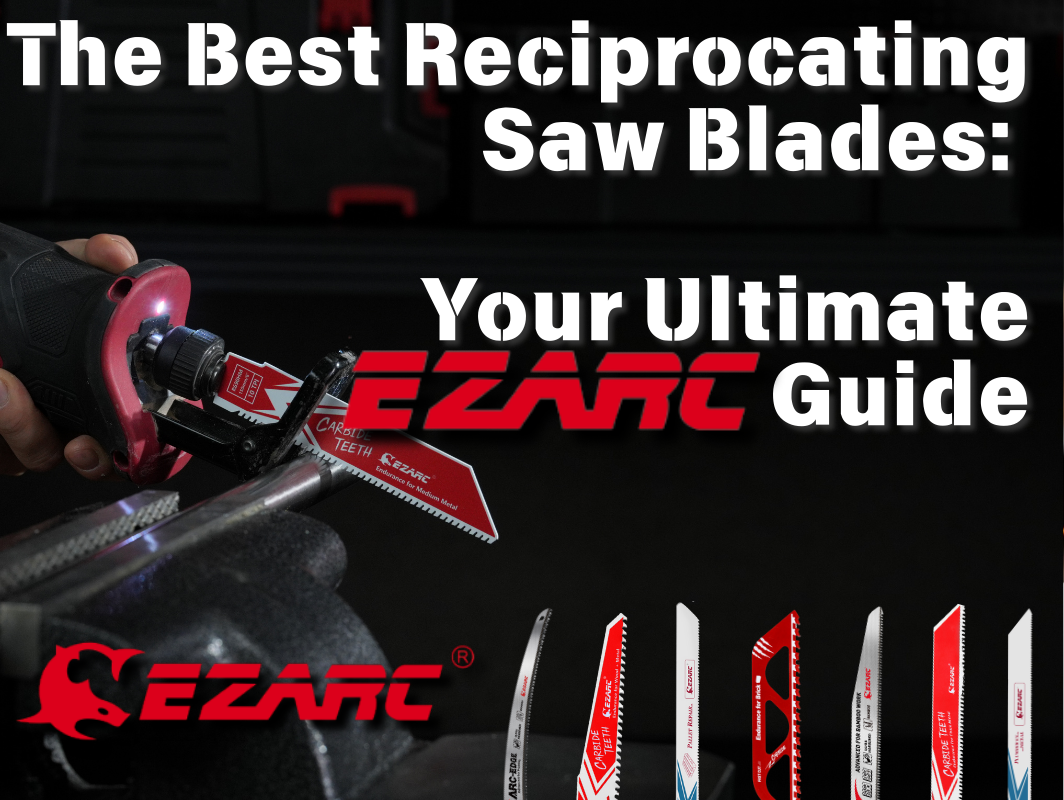If you’ve ever worked on a demolition or renovation project, you know that things rarely go as planned. You start cutting through a wall expecting clean wood, and suddenly your blade hits nails, pipes, or bolts. That’s the reality of demolition, unpredictable materials that punish your tools. And that’s exactly why you need the right sawzall blade for the job.
A demolition reciprocating saw blade is built for this kind of chaos. It’s designed to slice through wood, metal, and just about anything else standing in your way. Ordinary blades dull fast or break under the pressure, but a proper demolition-grade sawzall blade can power through where others fail.
In this guide, we’ll break down what makes a demolition reciprocating saw blade different, how it works, and why EZARC’s Carbide Tech 6TPI sawzall blade is one of the best options on the market for anyone tackling tough, unpredictable materials.
What Exactly Is a Reciprocating Blade?
Before we get into demolition-specific designs, let’s quickly cover what a sawzall blade actually is.
A sawzall blade is the cutting component of a reciprocating saw — a power tool that moves the blade back and forth in a rapid motion to slice through material. This aggressive movement is what makes it perfect for jobs that involve cutting through wood, metal, plastic, and other dense materials.
What sets one sawzall blade apart from another is its tooth design, material, and thickness. Some blades are optimized for clean, fine cuts in wood. Others, like demolition blades, are built purely for power and durability — to handle abuse without giving up.

What Makes a Blade “Demolition-Ready”
A demolition sawzall blade is built to survive extreme cutting conditions. It’s not about smooth edges or precision lines — it’s about cutting through anything in your way, fast.
Here’s what makes a demolition-grade sawzall blade stand out:
1. Heavy-Duty Construction
Demolition blades are usually thicker than regular sawzall blade, giving them the rigidity needed to handle impact and uneven materials. The thickness also helps prevent bending or snapping under stress.
2. Tougher Materials
While most standard blades are made from bi-metal (a mix of flexible steel and hard steel teeth), demolition sawzall blade use carbide teeth. Carbide is significantly harder and more heat-resistant than steel, which means it can handle metal, nails, and dense hardwoods without dulling.
3. Lower TPI for Faster Cutting
TPI stands for “teeth per inch.” The fewer the teeth, the more aggressive the cut. Most demolition sawzall blade have around 6 TPI, which allows them to bite deeper and clear out debris faster. This results in quicker, more efficient cutting through thick or mixed materials.
4. Reinforced Tooth Welding
Each tooth on a demolition sawzall blade needs to stay in place even under heavy pressure. That’s why high-end options — like EZARC’s Carbide Tech blades — use precision welding to attach each carbide tooth individually. This prevents chipping and tooth loss when cutting through hard metals or nail-embedded wood.
The Role of Carbide in Reciprocating Blades
Carbide technology has completely changed how sawzall blade perform in demanding conditions.
Carbide is an ultra-hard material made from tungsten and carbon, fused to steel. In a sawzall blade , it gives you unmatched wear resistance and the ability to cut through materials that would destroy a regular blade in minutes.
Here’s why carbide-tipped sawzall blade like EZARC’s are the go-to choice for demolition:

- 50x Longer Lifespan: Carbide teeth can last up to 50 times longer than standard bi-metal designs.
- Heat Resistance: They stay sharp even when friction generates high heat.
- Impact Strength: Carbide teeth don’t chip or break easily when they hit nails or bolts.
- Consistent Cutting: Even after hours of use, they maintain smooth, powerful cuts.
So when you’re cutting a mix of hardwood and stainless steel or tearing down walls with hidden screws and pipes, a carbide sawzall blade simply outperforms everything else.
EZARC Carbide Tech 6TPI Reciprocating Blade – Built for Demolition
When it comes to demolition work, few blades can match the durability and cutting power of EZARC’s Carbide Tech 6TPI sawzall blade .
This isn’t your average saw blade. It’s engineered for professionals who need reliability when tackling the toughest materials. Here’s what sets it apart:
1. Carbide Tech Durability
Each EZARC sawzall blade is built using advanced carbide technology. Precision-welded carbide teeth are designed to resist wear, chipping, and heat — lasting up to 50 times longer than standard bi-metal blades. Whether you’re cutting through oak, stainless steel, or hardened bolts, these blades stay sharp.
2. 6TPI Aggressive Design
The 6 teeth per inch (TPI) configuration gives you the perfect balance of speed and control. Deep gullets between the teeth clear debris quickly, reducing drag and overheating. You get smoother, faster cuts through both wood and metal without constant blade changes.
3. Demolition-Ready Performance
EZARC’s sawzall blade are made for real-world demolition tasks — the kind where you can’t predict what’s inside the wall or beam you’re cutting. From rusted pipes to nail-embedded wood, these blades deliver consistent performance through it all.
4. Strength and Flexibility Combined
Each carbide tooth is individually ground and welded onto a flexible steel body. That means you get the cutting toughness of carbide with the flexibility and shock absorption of steel. Even in high-stress cuts, the blade won’t snap or lose sharpness.
5. Two Lengths, Universal Fit
EZARC offers the Carbide Tech sawzall blade in 6-inch and 9-inch sizes. The 6-inch version is perfect for tight spaces, while the 9-inch model gives you more reach for deeper cuts. Both come with a 1/2-inch universal shank, fitting all major reciprocating saw brands — DeWalt, Bosch, Makita, Milwaukee, and more.
Why Choose a Demolition Reciprocating Blade Over a Standard One?
You might wonder if a regular bi-metal blade could do the job. For light cutting, sure. But demolition isn’t light work. When you’re cutting through a mix of materials — wood, metal, nails, and debris — a standard blade won’t last long.
Here’s why a demolition sawzall blade is the smarter choice:
- It cuts through multiple materials without needing blade changes.
- It lasts dozens of times longer than basic blades.
- It resists heat and impact, reducing downtime.
- It gives you cleaner, faster cuts, even under pressure.
If you’ve ever burned through a new bi-metal blade after just a few minutes of heavy use, switching to a carbide demolition sawzall blade like EZARC’s is a complete game-changer.

When to Use a Demolition Reciprocating Blade
Demolition sawzall blade are made for demanding situations where you need both speed and toughness. Here are some of the most common uses:
- Construction teardown: Cutting through wood with nails, screws, and bolts.
- Plumbing and HVAC: Slicing through metal pipes or ductwork.
- Automotive dismantling: Removing rusted bolts, frames, or exhaust parts.
- Remodeling projects: Tearing down old studs, flooring, or fixtures.
Basically, if you’re facing a job where the material isn’t clean or predictable, you want a carbide sawzall blade on your saw.
How to Get the Most Out of Your Reciprocating Blade
Even the best reciprocating blades benefit from good technique. Here are a few quick tips to help your EZARC demolition blades last even longer:
- Let the saw do the work — too much pressure can shorten blade life.
- Use the right speed — lower for metal, higher for wood.
- Keep your cuts steady to reduce vibration and wear.
- Avoid overheating — pause briefly between long cuts.
- Clean and store properly to prevent rust and buildup.
With the right care, a single carbide sawzall blade can handle job after job without losing its edge.
Why EZARC Blades Stand Out
There’s no shortage of sawzall blade on the market, but EZARC focuses on what actually matters — real durability, not just claims.
The Carbide Tech 6TPI sawzall blade isn’t just a stronger option; it’s a smarter investment. It saves you time, effort, and replacement costs. For anyone in construction, renovation, or demolition, it’s a blade that actually delivers on performance, not just marketing.

When you’re facing a wall full of nails or a pipe that refuses to budge, that reliability makes all the difference.
Final Thoughts
A sawzall blade might look simple, but it’s the heart of every cutting job. And when it comes to demolition work — where materials are unpredictable and demands are high — you need a blade that won’t quit halfway through.
That’s what EZARC’s Carbide Tech 6TPI sawzall blade is built for. With advanced carbide teeth, demolition-grade toughness, and a lifespan that outlasts standard blades by up to 50 times, it’s the ultimate tool for professionals who cut hard and cut often.
If you want a sawzall blade sawzall blade that can truly keep up, this is the one. Pick up a pack of EZARC Carbide Tech blades today — and see how much smoother your next demolition job can be.

 Oscillating Multi-Tool Blades
Oscillating Multi-Tool Blades
 Reciprocating Saw Blades
Reciprocating Saw Blades
 Cutting & Grinding
Cutting & Grinding
 Hole Saw
Hole Saw
 Drilling
Drilling
 Sanding & Polishing
Sanding & Polishing
 Hand Tools
Hand Tools
 Metal Worker & Fabrication
Metal Worker & Fabrication
 Woodworking & Carpentry
Woodworking & Carpentry
 Electrical & Plumbing
Electrical & Plumbing
 Automotive
Automotive
 Concrete & Masonry
Concrete & Masonry
 Demolition
Demolition
 NEW ARRIVALS
NEW ARRIVALS























Hinterlasse einen Kommentar
Diese Website ist durch hCaptcha geschützt und es gelten die allgemeinen Geschäftsbedingungen und Datenschutzbestimmungen von hCaptcha.